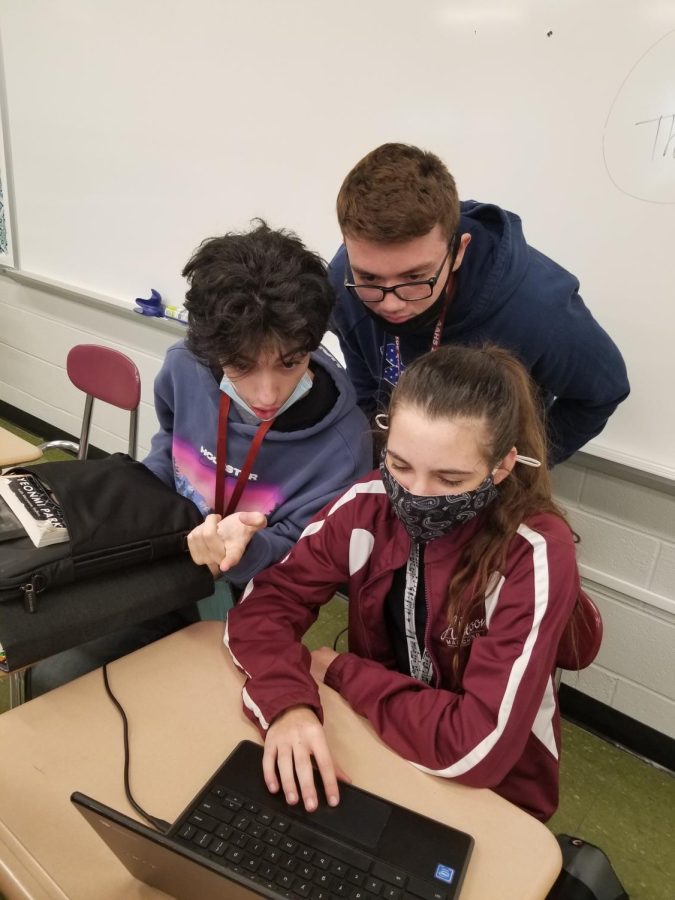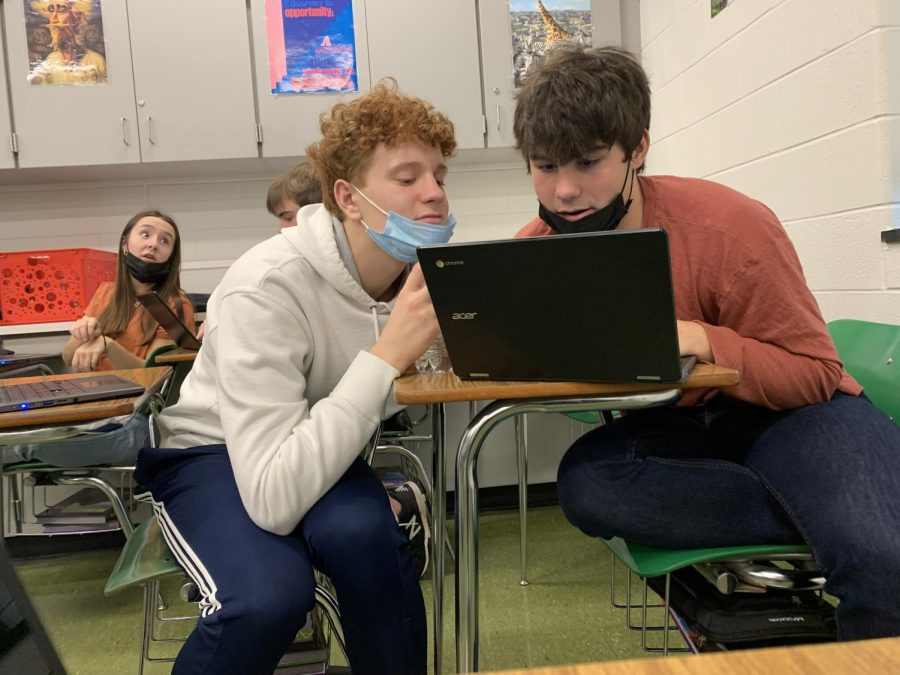Group projects enhance education, provide real world experience
Workin’ together. Juniors Ethan Dennis (left), Julia McCauley (right) and Owen Smithmyer (middle) work on their English work together. The students worked throughout sixth period making sure their work was perfect for the teacher.
Group projects are an essential part of a student’s academic career. Group projects help students engage with one other and create impactful bonds with other students doing the project. Group projects help students break up the work among one other and allow students to have some fun with friends while doing school work.
Group projects give students the opportunity to divide work among the group, so each student has less work to do overall. Group projects allow students to share their knowledge and bounce ideas off one another. If the project has a shared grade, students will hold each other accountable for the work and make sure it is completed to a certain standard. According to the “Washington University of St.Louis”, group projects enhance communication and other professional development skills in students.
“I like it because I am able to get more people to help me with the work we have to do, and I feel like it breaks up the work and makes the task easier to complete,” freshman Lundyn Treese said.
When most students get an assignment, especially a big one, they hope the teacher will allow them to get together with a group or partner up with someone. There is always the possibility the teacher may pick a student’s group for them which could be bad, but many students would rather have their partners picked for them on a large assignment than to not have any partners at all. When teachers do allow group work, almost all students pick friends. This allows students to have fun doing the work because they are able to interact with people they know and like.
Besides most students enjoying group work for the social aspect, research shows that students actually learn the material better in group projects. According to “Mndaily.com”, students were able to better understand the material given to them when they worked in groups; they also found in their studies that students were more engaged in the material when working in groups than they were when listening to a lecture.
When working in groups, students can use their strengths to help out the group and have another group member help them with any weaknesses they may have. For instance, if one student is a great speaker but not a great organizer, they could have another group member set up the format of a presentation and they can present it to the class. Group projects overall allow students to play on their strengths and let other students help them in areas they may be weaker in.
However, some students just do not like working in groups or even in partners and prefer to do their work alone. While the student should still have the choice to work alone, teachers should encourage their students to work in groups. As long as they are on task, group projects are an effective way to get students to enjoy school more and get work done in a more fun manner.
There is the possible issue that students may face if the other members of the group do not do their work. This issue can be solved by talking to those members or getting the teacher involved. Talk to members of the group who may not be doing the work they need to and involve the teacher if the student not doing their work still won’t do anything to help.
“It frustrates me when group members don’t work or do what they need to do in the project, But I usually can solve this problem by talking to any kids that aren’t doing their work,” freshman Elaina Pierannunzio said.
Overall group projects are a great way to boost morale for students and good for helping students engage in classwork. Teachers should look for more opportunities for students to work in groups and for students to interact with each other in the classroom.
Group projects waste students’ time
Working hard. Sophmores Tyler Kowalski and Bron Mosley work on a project. They work together and converse about their project, attempting to get everything done.
The idea of group projects can be controversial among students. While some students love the idea of slacking off and letting others do the project for them, the rest of the group is left to pick up their responsibilities. Group projects work if each person in the group works well together, every person in the group puts in the same amount of effort and does as they are supposed to. However, more often than not, one person is left to pick up the slack of everyone else. This is the most obvious problem with group projects; one student does all the work while the rest of the group benefits off of their efforts. This leaves the student to not only do their own work, but to do double or sometimes even triple amounts of the project. Another situation could be that a few group members complete their part of the project, but one student in the group leaves their assignment unfinished. The one student’s laziness could potentially affect everyone in the group’s grade.
Students’ grades should not be affected by the poor work ethic of their classmates.
For most group projects, the groups are randomly assigned or picked by a teacher, meaning that students have no say in who they must work with. Problems may occur with this if students do not get along with one another. It is difficult for students to work together if there is an issue with their peers. It may prevent the group from working coherently or from getting their work done. Also, students can get stuck with classmates who might not be willing to work or put in an equal amount of effort. Some students simply prefer to work by themselves to complete a project. Group projects requiring students to interact with one other can also give students social anxiety. Working with others on a project and possibly having to reason and debate might be nerve wracking to shy students.
From an educational standpoint, group projects are not the most beneficial learning opportunity. If most of the students dump their work on another person, they learn nothing and get no educational value from the project. Another problem might be if students mess around the whole time or put the work off until the end of the time period, then they will be forced to cram at the last minute and learn nothing.
The excuse that many teachers use in support of group projects is that it gives students a chance to bounce ideas off of one another and share opinions about topics. Group projects are good opportunities for students to work together and distribute the work for everyone’s benefit. However, group projects only work if each group member puts in an equal amount of effort, stays on task and works well together in a civil manner. More often than not though, it is rare that in a group project all members are on the same level intellectually and can work well together. Some aspect normally distracts the group or the members push off the tasks onto someone else. So yes, group projects can work but in very rare situations.
Group projects have been a reoccurring event in the classroom in which there is more lost than gained. While students often enjoy working together, group projects do not add much educational value to the school day and are a waste of time. Schools would be better off without group projects and would benefit with more time spent actually teaching.

